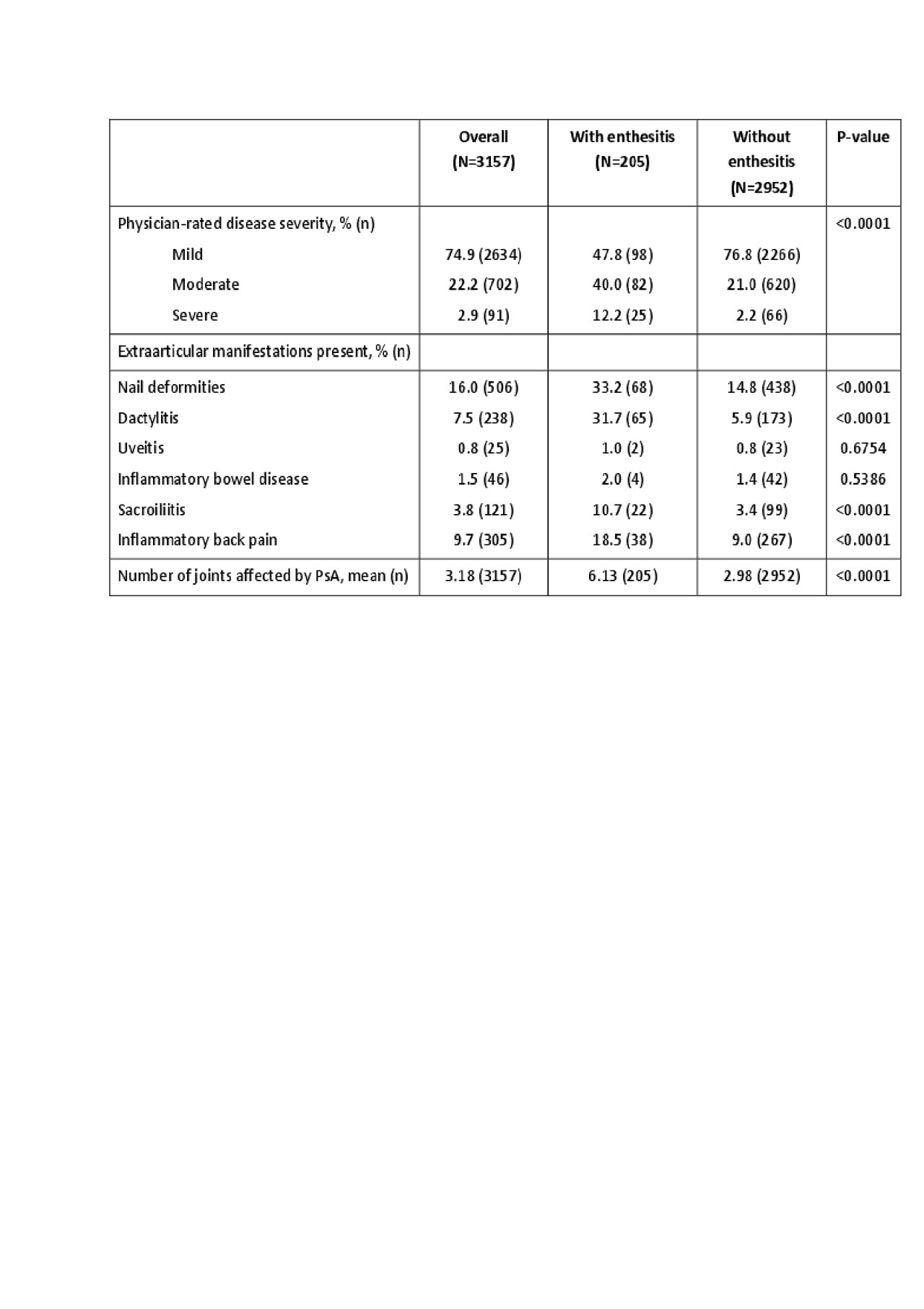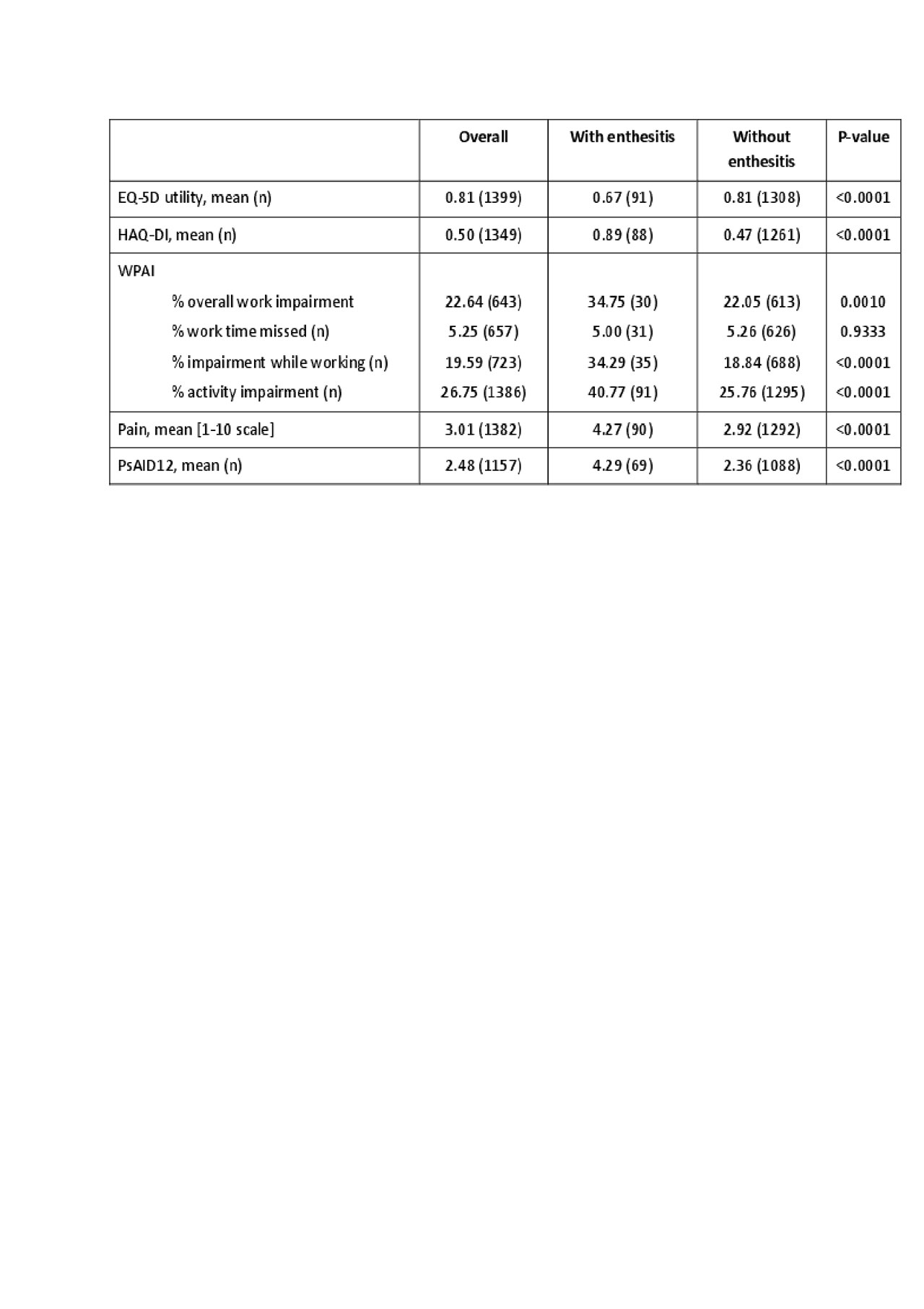Session Information
Session Type: Poster Session (Tuesday)
Session Time: 9:00AM-11:00AM
Background/Purpose: Enthesitis, a characteristic clinical feature of psoriatic arthritis (PsA) [1], is a core outcome for PsA clinical trials. While enthesitis is considered important when treating patients with PsA [2], there is limited evidence to show the impact of enthesitis on patient reported outcomes (PROs) and physician satisfaction with treatment in the real-world. The objective of this analysis is to describe the impact of enthesitis on PROs and physician satisfaction with treatment in a real-world setting.
Methods: Cross-sectional survey of rheumatologists, dermatologists, and their consulting PsA patients in Australia, Canada, EU5, and US, conducted by Adelphi from 2018-2019. Physicians assessed current presence and severity (mild, moderate, or severe) of enthesitis, overall PsA disease severity, symptoms experienced, and their satisfaction with disease control the current treatment provides (5-point Likert scale: very satisfied to very dissatisfied). Patient self-reported data included current level of pain (1-10 scale), EQ-5D, Psoriatic Arthritis Impact of Disease (PsAID12), Health Assessment Questionnaire Disability Index (HAQ-DI) and Work Productivity and Activity Impairment Index (WPAI-SHP). Bivariate descriptive analyses were conducted to describe features and outcomes in patients with and without enthesitis.
Results: Rheumatologists (454) and dermatologists (238) provided information related to enthesitis for 3157 PsA patients with 653 patient self-completed questionnaires. Mean (SD) age was 49.2 (13.3) years, mean (SD) body mass index 26.9 (6.5), 45.9% were female and 57.4% were in full-time employment. Enthesitis was present in 6.5% (205) of PsA patients surveyed. Patients with current enthesitis had worse overall disease severity compared to patients without enthesitis (12.2% vs. 2.2% severe) [Table 1]. Patients with enthesitis had more extraarticular manifestations, including nail deformities, dactylitis, sacroiliitis and inflammatory back pain than patients without enthesitis [Table 1]. Enthesitis was associated with more pain, worse quality of life (QoL), more disability, and a greater impact on work [Table 2]. Patients with enthesitis had increase NSAID and opioid pain medication use, but similar biologic use (with enthesitis 58.5% vs. without enthesitis 58.5%, p=1.0000). Physicians were significantly less satisfied with the control the current treatment provided in patients with enthesitis vs without enthesitis (57.6% vs 84.3% satisfied, p< 0.0001).
Conclusion: PsA patients with enthesitis had more severe disease and experienced worse QoL than patients without enthesitis but were not more likely to receive advanced therapies. Physicians were significantly more dissatisfied with treatment for patients with enthesitis than those without.
To cite this abstract in AMA style:
Orbai A, Julie B, Holdsworth E, Booth N, Hufford M, William M, Trevelin Sprabery A, Reginato A. Impact of Enthesitis on Patient Reported Outcomes and Physician Satisfaction with Treatment: Data from a Multinational Patient and Physician Survey [abstract]. Arthritis Rheumatol. 2019; 71 (suppl 10). https://acrabstracts.org/abstract/impact-of-enthesitis-on-patient-reported-outcomes-and-physician-satisfaction-with-treatment-data-from-a-multinational-patient-and-physician-survey/. Accessed .« Back to 2019 ACR/ARP Annual Meeting
ACR Meeting Abstracts - https://acrabstracts.org/abstract/impact-of-enthesitis-on-patient-reported-outcomes-and-physician-satisfaction-with-treatment-data-from-a-multinational-patient-and-physician-survey/


